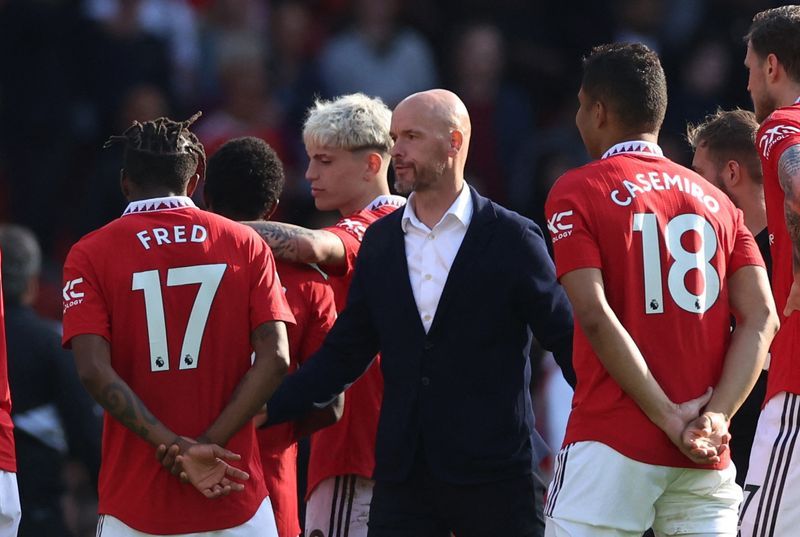Erik ten Hag can no longer claim his side is a work in progress even if bridging the gap to Manchester City looks beyond them
Erik ten Hag was deep in disappointment and down inside Wembley when, twice in three sentences, he referred to playing a “fantastic season”. One mention was individual, one collective.

The praise for David de Gea, after his latest error proved costly in the FA Cup final, may have been well-intentioned but soon proved deceptive. Ten Hag still sounded loyal then, but a more telling verdict came when the goalkeeper’s 545th Manchester United appearance became his last, when contract talks broke down and he departed.
Ten Hag’s other assessment reflected his own work. “We played a fantastic season and that is more than we could have expected than before,” he said. “We were third in the league, we qualified for the Champions League, we won a trophy and we were in another final.”
The second part is factually correct, the first element not overly controversial: if a top-four finish and a trophy perhaps should be normal for United, it represented a success after the hubristic misery of their 2021-22 campaign and the mess Ten Hag inherited was compounded by two chastening defeats at the start of his tenure. Ten months later, he emerged with his authority strengthened, with reasons to believe he will be United’s finest manager since Alex Ferguson.
He also raised his personal bar for success. What constitutes a fantastic season now?
The simple answer would be to win the Premier League, but that will require a more seismic step than shifting United from sixth to third, than reducing the gap to City from 35 points to 14.
Elevating expectations can be dangerous and Ten Hag said last month United should not talk about themselves as title contenders, arguing only City could. But actually participating in a title race, and sustaining their presence there, for the first time since Ferguson retired would be a positive sign in itself.
So would competing on both English and European fronts. United have only reached two Champions League quarter-finals in the decade since Ferguson stepped down, under David Moyes and Ole Gunnar Solskjaer and in years when they came seventh and sixth domestically. A Champions League semi-final would be another staging post if United are to shed their reputation as recent underachievers.
United contrived to both progress significantly last season while leaving clear areas for improvement. The most glaring was the away form against the better teams: it is often a test of mettle but if United showed it in other fixtures, they lost to each of the rest of the eventual top seven, conceding 22 goals.
A side who could string together unbeaten runs also showed a capacity to collapse. Given the importance Ten Hag places on character, it felt particularly galling.

It makes two of his signings pivotal in different ways. Andre Onana is the opposite of De Gea, the footballing goalkeeper who has taken them from one extreme to another. It is safe to assume United’s build-up play will be better and bolder but Inter Milan’s raft of clean sheets on their route to the Champions League final may be as pertinent; United’s €51 million outlay has to bring them a better goalkeeping goalkeeper, too.
Then there is Mason Mount, another signing with Ten Hag’s fingerprints all over it. If United’s new No 7 appears likely to displace Christian Eriksen from the first-choice team, and offers more mobility, there are nonetheless concerns over whether he can adapt to life as a central midfielder without leaving Casemiro with too great a defensive workload.
And yet United were also a team who scored too few goals last season, despite what may always remain a career-best season from Marcus Rashford.
The challenge is to reduce the reliance on him; even as he got 30 goals in all competitions, United only scored as many – 58 – as Brentford in the Premier League and were, along with Chelsea, the division’s great xG underachievers.
Profligacy was a problem, injuries another. If Ten Hag gave up on De Gea, he also lost faith in Anthony Martial. The third signing, Rasmus Hojlund, has had an inauspicious arrival in one respect: injured before he debuts, it may suggest he is a like-for-like replacement for Martial, and was an irregular scorer for Atalanta.
United have paid for potential and potency does not just have to come from the 20-year-old: they require more than four league goals from Antony, for instance.
But Hojlund’s move has taken Ten Hag’s spending over two summers to around £380m (€440m), while still giving the impression this is a work in progress. Nothing at United comes cheaply, or quickly.
They are still a club in limbo: nine months after the Glazers put the club up for sale, no takeover has been finalised. The chances are that irritates the demanding Ten Hag as much as supporters but it scarcely helps a manager with the drive to make United the best and who could probably deem this season a triumph if they end up as the best of the rest.

